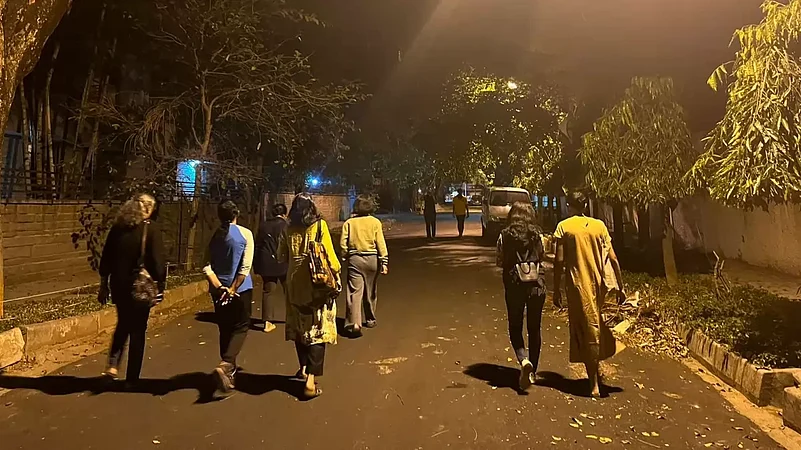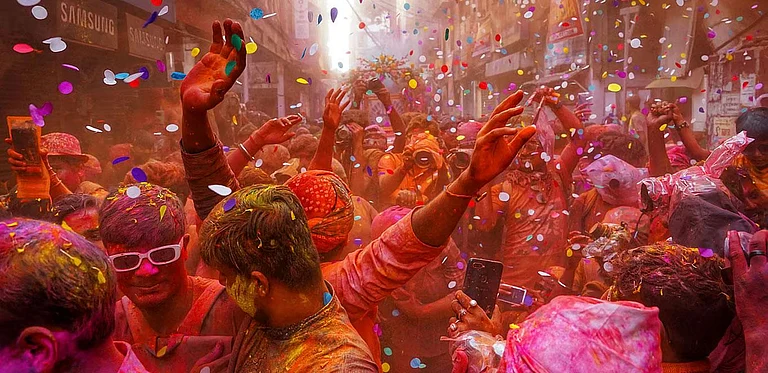At 10:30 pm on a Saturday, women arrived in groups of twos and threes, some holding hands and some looking behind to see if they were being followed, and gathered outside a cafe at Koramangala in Bengaluru. The motive was just to walk at midnight. But why? The sentiment that echoed in the answers was “because we should be able to”.
“In no other part of the world, would we need to explain why we are doing this. But it is different here,” said a team member of Women Walk At Midnight, the women’s collective that organises the walk.
“We walk together on our streets, in our city, in quiet resistance. And this cannot happen without solidarity — we are strength in numbers,” said a message on the WhatsApp group prior to the walk.
These midnight walks are an effort to reclaim the women’s right to public space in the night. These walks began after the brutal murder and gang rape of a 23-year-old physiology student in Delhi in December 2012 — known as the Nirbhaya case.
Over the years, the unspoken rule that a woman should not go out of the house alone once the Sun sets has seeped into our minds, homes, and lives. The rule was evident as the clock struck 11 pm on that night when we found that the only women who were out on the streets were us.
Yet somehow, we were not alone. A similar walk was taken by women in Delhi on the same day, but both of these walks were for different reasons. Some wanted to explore the city. Others wanted to feel a sense of freedom.
“The kind of household I come from, I cannot imagine stepping outside of my home after 6 pm. It feels exhilarating to be out at this time without anyone on my back. Moreover, being with all of you makes me feel safe. I would not have done this alone,” said a young college student.
As this student looked at unfamiliar faces around her, she realised that there was something familiar about them too. They identified themselves as women with shared experiences of being confined to their homes after a certain timestamp and eager to take part in resisting such confinements — just like herself.
After exchanging pleasantries, some ground rules were laid down.
“This is just a walk. We will keep checking with each other. We can stop when you want to. We don’t have to go anywhere you don’t want to,” said the organiser of the walk.
A strange sense of comfort and excitement hung in the air as we moved along the streets of Koramangala, a part of the city that never sleeps — especially on a Saturday night. Every now and then, they would pause to ensure everyone was at the same pace.
“Would it be okay if we walked in a dimly lit part of the street?” said Priya, one of the organisers of the walk. The excitement among the young women was enough of a response. “Let’s do it,” one of them said.
As we strolled along the dimly lit street, the yellow glow from streetlights cast an eerie shadow upon them. This was the kind of night we had always craved to experience. It feels like we finally have the space, the women said.
One of the women, a member of the collective that organised these walks in Delhi, said, “The yellow light still makes it feel like it is night. In Delhi, the street lights are bright and white. It’s like the city is trying to force safety upon us.” The others nodded in agreement. The woman continued, “It’s like someone is yelling at you, saying ‘You are safe! You have to feel safe because of these bright lights!’”
As the night went on, the group bonded over their fears of walking alone. “If I was out here by myself, I would be scared of that car right there,” a student says pointing towards a lone car on the street. “Also, that man.”
This perpetual state of fear when corroborated with numbers presents the grim reality for women safety in the city. The Bengaluru Police Commissioner recently disclosed that the city witnessed a 30 per cent increase in cases of crimes against women and children in 2022, compared to crimes of other nature.
But it was in the quiet moments between conversations, the shared glances, and nods of understanding that we realised that our right to walk does not get snatched away by the rising numbers.
“I think it's time for me to be out in a space that I consider home to a large extent. I felt that sense of freedom after my first walk and I have not stopped going on these walks since then because I want to continue to feel that way,” a woman on the walk said.
After the walk ended, the group gathered to talk about how they felt. Someone said, “Does anyone want to say something?” The known silence crept in. Tired but at ease, and as if on cue, another woman said that she wanted to lead the walk in her area.
“It should be a normal thing to do right? We are just walking at night. We should be able to walk at night,” said the woman.






















